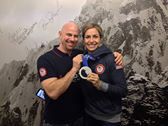Memories of the Sochi Olympics

SALT LAKE CITY — Zach Lund, an Olympic skeleton racer, changed roles for the 2014 Sochi Winter Olympic Games and became an assistant coach on the United States Olympic skeleton team.
The U.S. skeleton team went from "being decent to being one of the best in the world," said Lund, a 1998 Judge Memorial Catholic High School graduate. "We had successful Games and it was really rewarding to see our efforts culminate in the 2014 Olympics with medals."
Noelle Pikus-Pace won the silver medal and Matt Antoine won the bronze medal in the skeleton race during the Sochi Olympic Winter Games.
Lund said there is quite a difference between being a skeleton racer and being a coach.
"At first I had a hard time adjusting," Lund said, adding that an athlete has to be self-centered to get ready for the Games. "It went from having my own issues to doing everything possible to help the [team’s] athletes succeed."
Today’s Olympic athletes have better equipment, coaching and financial support than Lund did while he was competing, he said, which was something he had to accept as he concentrated on coaching.
Pikus-Pace agreed that "there weren’t any coaches so Zach and I kind of taught each other along the way," she said. "Zach was always an athlete that I could relate to. We developed in the sport together and started competing about 14 years ago on the lower circuits. We have similar styles in competition; we like to keep it light, we like to have fun and enjoy the moment. Some athletes are stressed and focused."
As a coach Lund was "incredible," said Pikus-Pace. "To have him as a teammate for so long and then as a coach was a perfect journey and a perfect ending as I crossed that finish line and won an Olympic medal. To have him standing there with his arms up in the air jumping up and down, so excited for me because he was there all along the way, and I knew that he had played a major role in helping me to get there."
That race "was unbelievable," Lund said. "I always knew she could do it."
Lund learned to "help each athlete find that 1 or 2 percent edge that would make the difference when competing on such a high level. I found what I could do to help the athletes set themselves apart from the other people in the Olympics in such a close competition with the best in the world," he said.
Lund has found coaching to be very rewarding. "It was a great experience and a lot of fun to be involved," he said.
Before the 2006 Olympics, Lund was the gold medal favorite in the skeleton race, but was disqualified two hours before the opening ceremony for a doping violation for using an anti-balding medication that has since become legal.
"That was really tough going from being the gold medal favorite to not even being able to race," he said. "I came back strong by setting the track record and won the overall World Cup title in 2007 and was ranked No. 1."
That same year, Lund had an accident in Switzerland that damaged his neck, ribs and back. That was a turning point in his career, he said.
"I never was quite the same," Lund said. "I struggled in 2008 and 2009 and I raced with a torn disk in my neck and could barely compete."
In the 2010 Olympics Lund finished in fifth place in Vancouver.
"My health never really came back and by then my wife and I had two children," he said. "While I was taking time to heal, athletes were coming to me asking for my help. I hadn’t considered coaching because of the time requirement on the road, but looked into it and received an offer from both the Russian and the U.S. teams. I was able to work with the U.S. team and I’ve enjoyed it."
© Copyright 2024 The Diocese of Salt Lake City. All rights reserved.

Stay Connected With Us